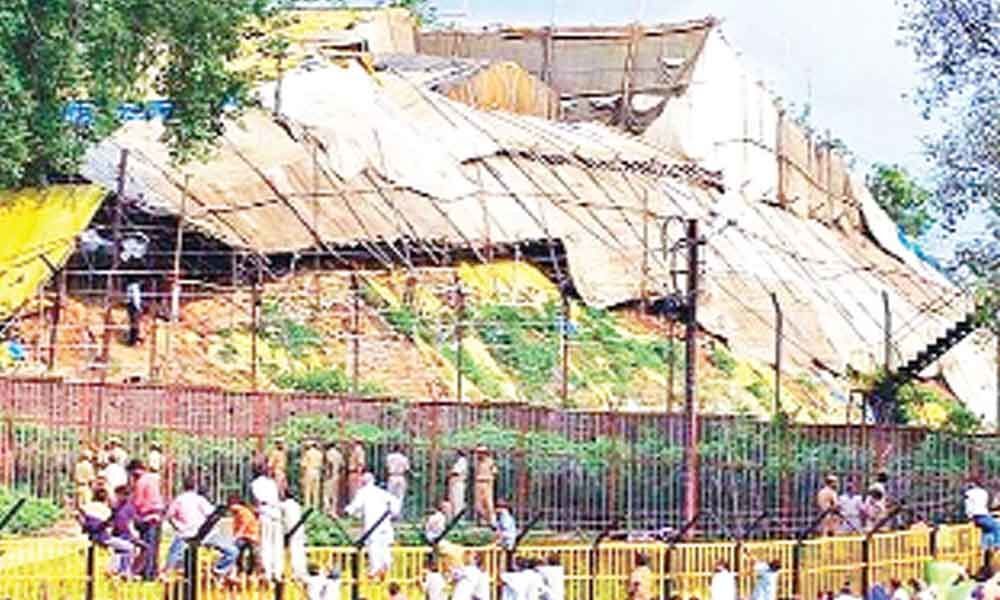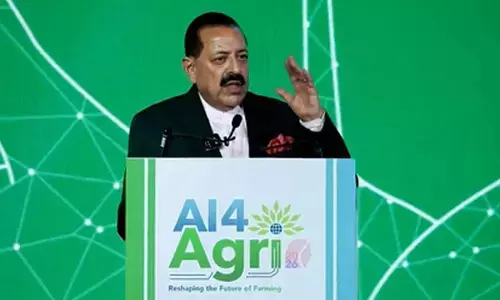An unusually quiet Ram Navmi in Ayodhya

There was a singular absence of frenzy last week in Ayodhya on the occasion of Ram Navmi.
There was a singular absence of frenzy last week in Ayodhya on the occasion of Ram Navmi. As the campaign for election 2019 rose to a crescendo, one would have expected the Hindutva Brigade to turn up in full force for several reasons.
To obtain the Lord's blessings for the do or die battle. And to focus on Ayodhya to keep the issue simmering during these crucial elections. True, the matter is in court but so is the Sadhvi Pragya Thakur matter.
When were such niceties sacrosanct for the current lot? More likely, the Mandir-Masjid soufflé is not rising.
I have seldom seen Rama's city so bereft of political presence. The old colonial bungalow refurbished as Faizabad's Circuit House looks like a spruced up haunted haven.
Cooks, bearers, housekeepers, in white, appear at one end and shuffle past with no apparent work in hand. Well past midnight, there is a knock on the door. "Please let me have your remote," a voice implores.
Spooky, isn't it? Apparently, someone of consequence has arrived unexpectedly. It turns out that the solitary remote services all the air conditioners which are available in abundance. Even the dressing rooms are air conditioned.
Cross into Ayodhya and throngs of devotees chanting 'Jai Sia Ram' choke the lanes. Milling crowds climb the wide staircase of the Kanak Bhawan Ram temple. Chanting devotees come in waves, their hands uplifted in reverence, eyes focused on the jharoka or balcony beyond which aarti begins at 11 a.m. in preparation for the Lord's birth at noon.
But even at noon there is no frenzy, just chants of reverence accompanied by a surge towards the balcony for a closer experience of the moment of birth.
I do not know how purists will take this report but my wife and I are rather proud that we had more than a ringside seat, virtually within whispering distance of the birthing suite where Ram was born.
The pujari with a "thal" or plate of lamps makes circles around the imaginary bed. The lights flicker on the gold silk and taffeta, neatly folded in Ram and Sita's wardrobes lining the walls all around us.
Once Ram lalla is born, Madhukar Singh of Orchha and his Rani wave a "murchal" a sort of whisk in slow, pampering motions around the infant. Madhukar's ancestors, the rulers of Orchha in Bundelkhand, built the Kanak Bhawan Ram temple complex in the late 19th century.
Since then it has been the responsibility of the family to personally supervise Ram Navmi and other festivals associated with Ram.
It is hard to imagine larger crowds, steeped in such unadulterated reverence. Pardon the thought, but is there a need for a parallel temple of contention which will only neutralise the good-natured atmospherics of the birthday celebrations in this magnificent Ram Mandir?
Our visit was a function of both: my passionate pursuit of the multicultural and Madhukar Orcha's profound hospitality. The red and yellow thread the priest tied on my wrist was, in its minutest detail, similar to what my mother did to visitors of diverse faiths who visited our village home during Moharram.
In fact, even the Imambara, where a replica of Imam Hussain's tomb in Karbala is kept, was not very dissimilar to the sanctum sanctorum - all peculiarly Indian.
Mosques, of course, are different. There is a great deal in common between the Jama Masjid, Blue Mosque or the Shah Abbas mosque in Delhi, Istanbul and Isfahan respectively. But these mosques, in their distinct grandeur, are marvels of architecture.
Not surprising, therefore, that in Ayodhya, the thought of Babri Masjid, should cross one's mind. It was by no stretch of the imagination a historic mosque. It had no architectural merit compared to the ones listed above.
In August 1989 when I visited Ayodhya for the Shilanyas, the scene was distressing. I have since found myself on the same wavelength as the moderate cleric, Maulana Kalbe Sadiq.
Since his cancer has galloped to its last stages, what the Maulana says is virtually his last will and testament: "A Muslim can spread his prayer mat anywhere, facing the Kaaba, and say his prayers; a Hindu consecrates the idol forever.
The difference is enormous. Just look at the Muslims in India today: unwise politics around the Mandir-Masjid issue has contributed greatly to their unhappy situation."
If Muslims win the Ayodhya case in the Supreme Court and decide to make a gift of the land for the construction of the temple, "The gesture will electrify Hindu masses; communal politics will be defeated."
The soft, reverential tones of the ceremonies at the Ram temple are such a welcome relief from the warlike atmosphere of intrigue and deception that we witnessed during the Shilanyas 30 years ago.
I can never forget, the District Magistrate of Faizabad, Ram Sharan Srivastava's harassed face under instructions to implement the underhand, duplicitous order handed over to him by the Congress High Command - Rajiv Gandhi, Arun Nehru and Narayan Datt Tiwari.
The situation was this: Allahabad High Court had stayed any brick laying on "disputed" land. But Ashok Singhal of the Vishwa Hindu Parishad threatened "rivers of blood", if Shilanyas were not held where the VHP wanted it.
The District Magistrate was instructed to accede to Singhal's demand "confidentially". In other words, brick laying would be allowed clandestinely on disputed land. Singhal had agreed to keep this secret.
But the Congress, to score brownie points, announced that the brick laying ceremony was allowed only on land which was "not disputed". No sooner was the handout issued, then Singhal, not to be upstaged, held a press conference.
"We have laid the Foundation Stone at exactly the place within our construction plan." The Congress double crossed the people; Singhal double crossed the Congress - and all in the name of Maryada Purushottam, the perfect man.
I removed this nightmare from my mind and left the sanctum sanctorum remembering Allama Iqbal's couplet: "Hai Ram ke wajood pe Hindostaan ko naz Ehle nazar samajhte hain usko Imam e Hind." (Ram is Hindustan's pride. Men of vision consider him the Imam of Hindustan.)
(Saeed Naqvi is a commentator on political and diplomatic affairs. The views expressed are personal)








